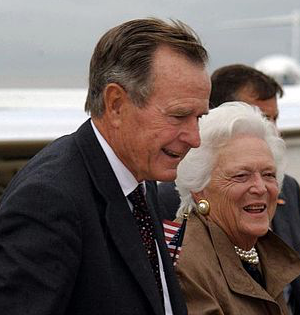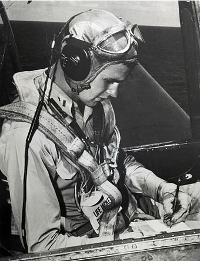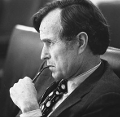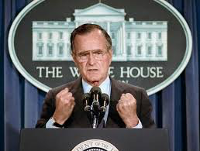|
Former President George Bush Dead at 94
December 1, 2018
George Bush, the 41st President of the United States, has died. He was 94, the first former President to reach that age. Bush was to lie in state at the Capitol in Washington, D.C. The U.S. declared a national day of mourning in his honor, and flags over federal buildings flew at half-staff. Texas ceremonies were planned for Houston, Spring, and College Station. Bush was to be buried next to his wife, Barbara Bush, who died in April 2018, and their daughter, Pauline, who died in 1953, on the grounds of his presidential library, in College Station. Words of remembrance came in from around the world, including from the Points of Light Foundation, which Bush founded. Named for a phrase that Bush used in a speech many years before ("a thousand points of light"), the foundation acts to encourage people to solve the world's problems through service. While he was President, Bush recognized more than 1,000 people with the Daily Point of Light Award. The foundation continues to so recognize people; until very recently, Bush continued to sign the certificates. Bush was born on June 12, 1924, in Milton, Mass. His father was Prescott Bush, a Senator; his mother was Dorothy Walker. Young George attended the boarding school Phillips Academy, in Andover, Mass. He met Barbara Pierce, who would become his wife, in 1941; they were married in 1945 and had six children: George W., Robin, Jeb, Neil, Marvin, and Doro. A Navy veteran and longtime politician, Bush was the first American to have been President and to have a son who was also President and then re-elected, when his oldest son, George W. Bush, was elected President in 2000 and re-elected in 2004. (John Adams was the 2nd President, and his son, John Quincy Adams, was the 6th President; the latter Adams was not re-elected.) Bush, at 18, held off on going to college in order to fight in World War II. He joined the Navy, becoming the youngest pilot in that branch. He flew 58 combat missions and escaped death several times, including a rescue by a U.S. Navy submarine after his plane was shot down over the Pacific Ocean. He received the Distinguished Flying Cross. Bush returned home from the war and went to Yale University, earning a degree in economics in 1948. He moved to Midland, Texas, and became a fixture in the oil and gas industries. He was founded his own oil company and was a millionaire by the time he was 40, in 1964. Bush was elected to the House of Representatives from Texas's 7th District in 1966 and served two terms. He had also run twice, unsuccessfully, for the Senate, in 1964 and in 1970. In 1971, then-President Richard Nixon named Bush as U.S. Ambassador to the United Nations. Bush served in that capacity for two years and then was named chairman of the Republican National Committee. In this two years in that post, he presided over the events that ended with Nixon's resigning as President. Bush transitioned to the world stage again, this time as U.S. envoy to China. He served in that capacity for 14 months before being named director of the Central Intelligence Agency. He was head of the CIA for only a year, but his time there is revered, as illustrated by the headquarters campus's being named the George Bush Center for Intelligence. Bush's first run for President was in 1980. He won the first-of-the-season Iowa caucuses that year but faded in popularity and left the race a few months later. Ronald Reagan secured the nomination, however, and named Bush as his running mate. Bush agreed to run with Reagan despite earlier political disagreements. At one point, Bush had labeled Reagan's policies "voodoo economics." Bush served as Vice-president for both of Reagan's presidential terms and then succeeded Reagan as President, in 1989, winning a lopsided presidential vote count against Democrat Michael Dukakis. Bush was leader of the U.S. at the end of the Cold War. The Berlin Wall and the Soviet Union both ended on his watch. He was widely praised for his low-key approach in handling what could have become any number of international crises. Bush is also remembered for forming an international coalition to protest the Iraqi takeover of Kuwait in 1990. That protest turned violent in the form of the Persian Gulf War, which proved to be short. The U.S.-led coalition advanced far into Iraqi territory in order to secure the victory and had the opportunity to conquer Iraq and its recalcitrant leader, Saddam Hussein. Bush refused to do so. (His son, the 43rd President, would make the opposite choice 12 years later.) Bush Sr. is also remembered for signing the North American Free Trade Agreement (NAFTA), which created a free trade bloc among Canada, Mexico, and the U.S. Bush ran for re-election in 1992 but was defeated by Arkansas Gov. Bill Clinton. One memorable reason that many historians cite for Bush's defeat–despite his 90-percent approval rating just a few months earlier, after victory in the Persian Gulf War–was his well publicized 1988 anti-tax promise: "Read my lips: no new taxes." Bush famously broke that promise, signing a bill that cut the federal deficit by, in part, raising taxes on the wealthy, many of whom abandoned him in the 1992 presidential vote. Many historians will also point out, however, that the U.S. suffered through a recession straight after the Persian Gulf War and that that recession was very much on the minds of voters in November 1992. One of Clinton's campaign slogans was, "It's the economy, stupid." Another factor in that 1992 presidential campaign was the emergence of a popular third-party candidate, billionaire H. Ross Perot. Although Perot won no states, he won 19 percent of the vote and served as a figurative, if not literal, symbol of dissatisfaction with Bush and his presidency. Next page > His Later Life > Page 1, 2 |
Social Studies for Kids |
Social Studies for Kids
copyright 2002–2025
David White








